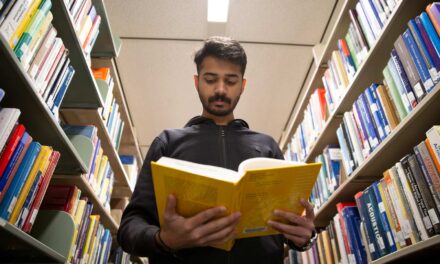
ASU produces a bumper crop of Southeast Asian entrepreneurs
Innovators in the Lower Mekong region grew their entrepreneurial skills, agricultural tech and business ideas in Mekong-U.S. Partnership Young Scientist Program
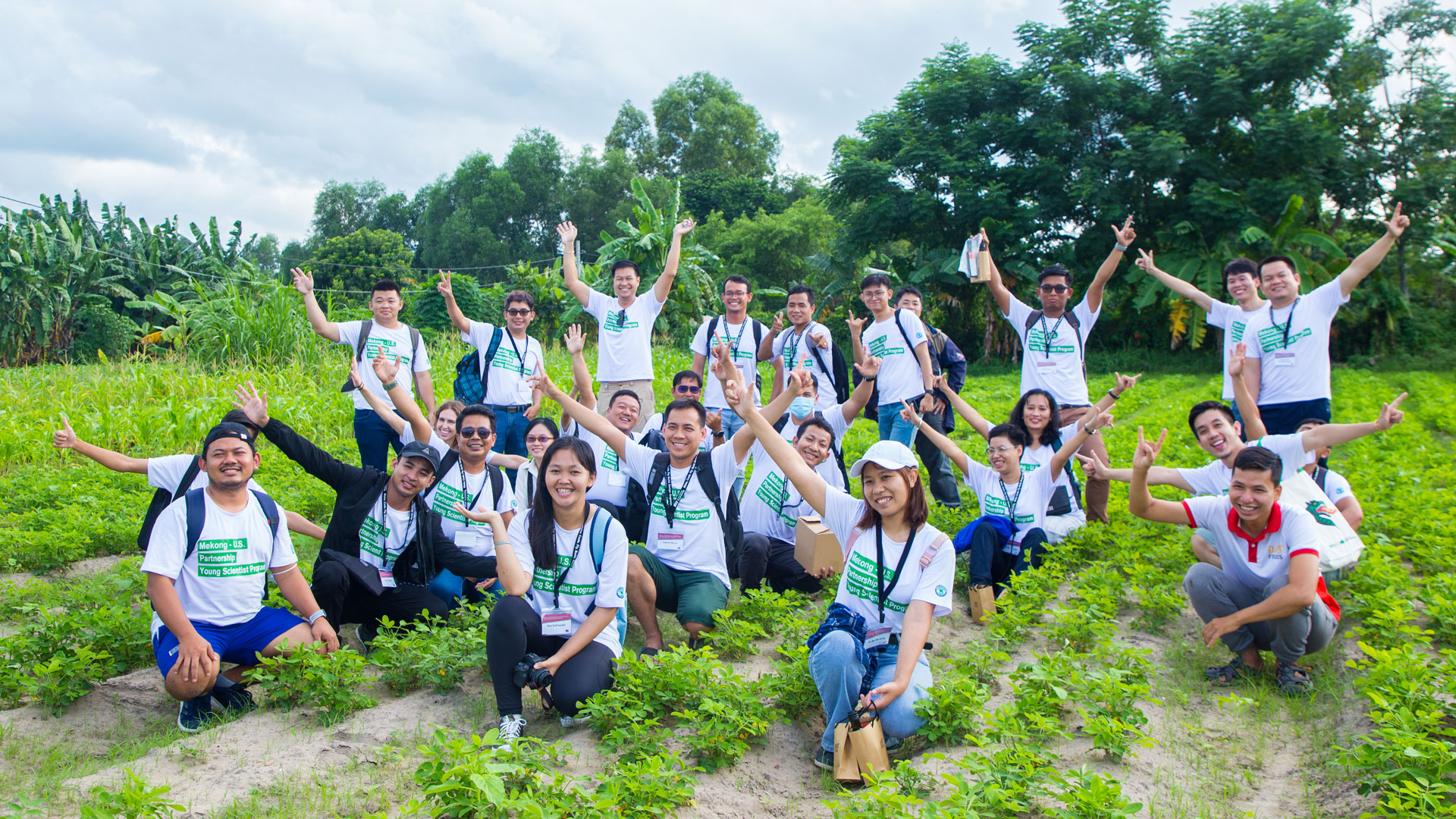
The Mekong River forms a fertile plain across much of Southeast Asia. Agriculture plays a vital role along the Lower Mekong — in which Cambodia, Laos, Myanmar, Thailand and Vietnam are located — and farming is the primary occupation of the region’s rural inhabitants.
Technology that can enable sustainable agricultural practices and increase productivity are underutilized in each of these countries. So, the Mekong-U.S. Partnership Young Scientist Program recently engaged the region’s young scientists and researchers in the areas of horticulture, engineering and business to develop solutions to agricultural technology and business challenges. Chosen through a competitive application process, the 27 Young Scientist Program fellows participated in a hybrid virtual and in-person event in June and July.
“ASU and its partners in the U.S. Department of State and local industry have a long history of enhancing the skills of bright young professionals to improve people’s lives in the Lower Mekong region,” says Jeffrey Goss, associate vice provost for Southeast Asia, executive director for the Office of Global Outreach and Extended Education and an assistant dean of the Ira A. Fulton Schools of Engineering at ASU. “These innovators were eager to learn and collaborate and are now set to make positive impacts in their communities. I look forward to seeing what they will achieve in agricultural advancement and other critical fields vital to their home countries.”
The participants first attended a series of virtual sessions with entrepreneurs and faculty members from the Fulton Schools. Over the course of a month, they learned innovation and entrepreneurship concepts and how to apply them to the agricultural technology, or agritech, sector.
Following the virtual sessions, participants attended a one-week immersive and collaborative experience in partnership with Ho Chi Minh City University of Technology and Education, Vietnam, in mid-July. They engaged with guest lecturers including investors, agritech entrepreneurs and environmentalists to develop and fine-tune investor pitches for the chance to win $15,000 in seed grant funding for their idea.
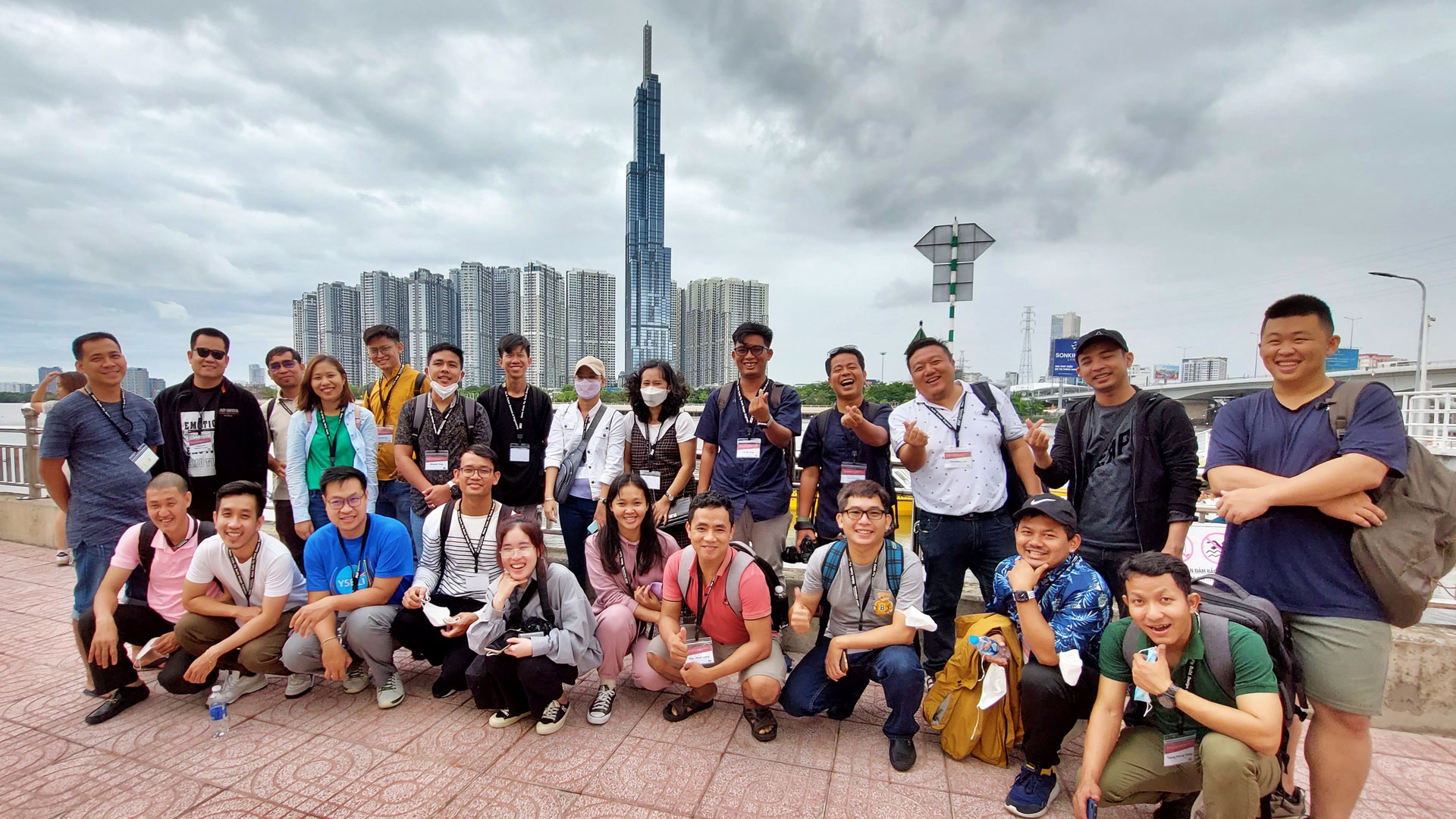
MUSP Young Scientist Program participants pose in front of the Ho Chi Minh City skyline in Vietnam. After four weeks of remotely learning important concepts for successful startups and investor pitches, they attended a five-day in-person event at the Ho Chi Minh City University of Technology and Education. Photo courtesy of Meghan Gibson
Cultivating sustainable economic success
The MUSP Young Scientist Program, formerly known as the Lower Mekong Initiative Young Scientist Program, is sponsored by the U.S. Department of State and implemented by Arizona State University to promote equitable, sustainable and inclusive economic growth in the Lower Mekong region.
“The Young Scientist Program is just one part of the commitment of the United States to help Mekong countries address the unique challenges that the Delta faces,” said Robert Greenan, acting consul general of the U.S. Embassy and Consulate in Vietnam, during welcome remarks for the last week of the program. “We hope that through this program, early career scientists like yourselves in this region will continue to have an opportunity to do their good work, to collaborate on research, and to come together to find the solutions to transnational problems.”
In total, the Young Scientist Program has welcomed 84 fellows from Cambodia, Laos, Myanmar, Thailand and Vietnam to develop ideas in three areas: water, energy and environmental sustainabilty in 2018; public health and bioinformatics in 2019; and agricultural technology and innovation in 2022, after a pause during the first two years of the COVID-19 pandemic.
“The Young Scientist Program has demonstrated the effectiveness of transnational collaboration by early and mid-level professionals in some of the most critical fields,” says Meghan Gibson, a program manager in Global Outreach and Extended Education at the Fulton Schools. “This program has not only brought together like-minded individuals driven to bring continued development and innovations to their countries, but has also introduced them to connectors in the form of expert scientists, investors and entrepreneurs to enhance their network and provide accelerator opportunities for their ventures.”
Participants harvest a bounty of knowledge
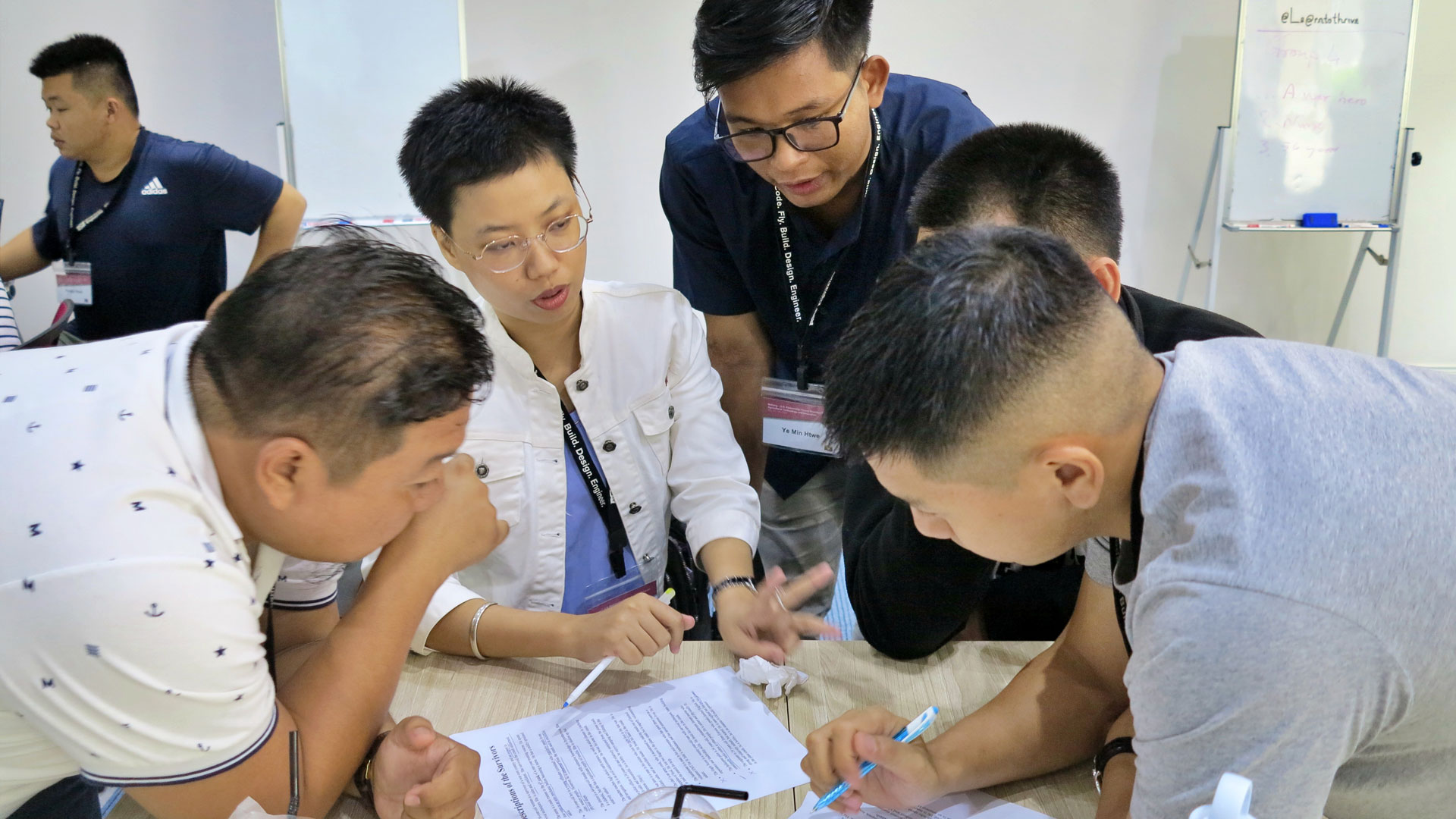
MUSP Young Scientist Program fellows work together to learn and apply entrepreneurial concepts during the final week of the program held in Ho Chi Minh City, Vietnam. Photo courtesy of Meghan Gibson
Throughout the 2022 program, participants learned important skills centered around entrepreneurial concepts such as understanding their audience, creating a business model and pursuing investment opportunities as well as persuasion and storytelling techniques to generate a call to action.
Many of the participants — including Phem Menghak, a governmental institution researcher from Cambodia — were learning these concepts for the first time.
“This is my first business or entrepreneur training,” says Menghak, who developed a pitch for a chicken breeding strategy and the use of smart sensors at chicken farms in rural Cambodia to improve the animals’ health and growth, and increase the farmers’ profits. “So, the program was a foundational step to let me understand where I should start and what I should do next to achieve my goal of helping small farmers to improve their livelihood through the design thinking model, business [coursework], and connecting ideas from participants, panelists and other presenters.”
The introductory courses were taught online by Ken Mulligan, a faculty associate in the Fulton Schools who teaches technology entrepreneurship and strategic enterprise innovation to ASU students online and on-campus as well as internationally in Pakistan, Laos and Sweden. Mulligan is active in the ASU student entrepreneurial community, in his consultancy Ken of Zen, and is a veteran of several technology startups, including cloud-based cybersecurity startup CyNet, for which he is a former CEO.
Mulligan’s lessons were inspired by the National Science Foundation’s Innovation Corps program’s systematic approach to commercial development as well as the Lean Startup methodology for rapid venture development. He built upon the participants’ knowledge of the scientific method and experimental design to introduce new concepts of validating an idea’s commercial potential, market desirability, technical feasibility and financial viability.
“These virtual agritech workshop sessions were designed to assist the attendees to move the fruits of their research from the physical lab or the lab of their mind into the marketplace,” says Mulligan, who notes that the session templates can easily be redeployed for future workshops throughout Southeast Asia. “They learned how to apply design thinking to assist them in finding an underserved need in the agricultural value chain and use the Lean Startup methodology to search for and design a business model that can scale and repeat.”
Phoo Phoo, a Young Scientist Program fellow from Myanmar, found the lessons to prepare for an investment pitch to be especially helpful.
“Preparation for the pitch deck is most valuable for me because I believe that we have to prepare not only for the pitch but also for our startup journey,” says Phoo, who is developing a tissue culture lab to solve the problem of seed-borne ginger diseases and provide farmers in Myanmar access to disease-free, high-quality ginger seeds. “It made me think several times about the problem that I am going to solve through my product.”
During the weeklong, in-person event, participants learned more about the importance of agricultural technology for their region through a variety of speaker and field trip experiences. The speakers represented educational technology companies, investor agencies and changemakers in the area, including Amazon Web Services, Ascend Vietnam Ventures and international development organization SNV.
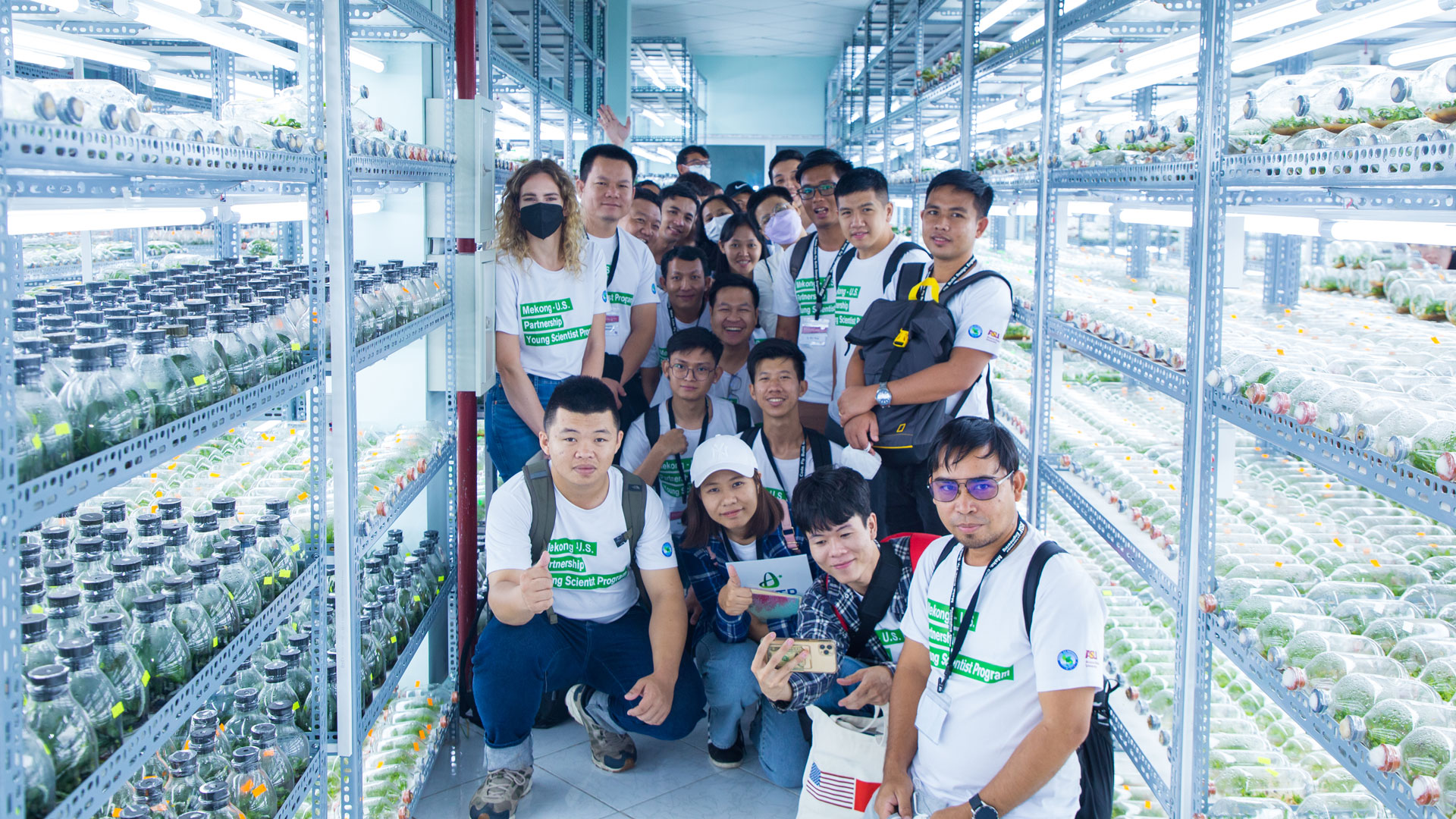
The MUSP Young Scientist Program participants pose at Ho Chi Minh City Hi-Tech Agricultural Park on a field trip where they learned about agricultural and aquaculture challenges and new technologies being implemented by businesses in the region. Photo courtesy of Meghan Gibson
As participants expanded and practiced their entrepreneurial skills, they gained insights from experienced agritech entrepreneurs about successes, challenges and lessons learned. Investors and industry connectors — who bring together people and resources to turn ideas into reality — shared their expertise in what they search for when they consider investing in or collaborating with a local startup.
Eddie Thai, a general partner at Ascend Vietnam Ventures, gave a keynote presentation to the Young Scientist Program fellows in which he described his experience and offered tips for success.
“Aim big, make the customer your focus, fail early and often to succeed sooner, and hire people who are better than you,” Thai said in the address. “It sounds pretty obvious when I say it out loud to myself, but the hardest part is to remember [these tips] to believe in yourself and to put them into action every day.”
Jim Kouphokham was a mentor in the program and a participant of the 2020 Young Southeast Asian Leaders Initiative Summit Regional Agribusiness Incubator Workshop in Laos. He is founder and project director of Technovator, founder and CEO of The Makerbox Lao and has been involved in many other startups. He encouraged participants to practice an entrepreneurial mindset and use the skills they learned “not just to start their own business, but to start a community that is full of innovative solutions.”
Kouphokham also gave advice to the Young Scientist Program fellows to take calculated risks and take advantage of opportunities to collaborate.
“You can find your peers in the same community, the same country or within the same region,” he says. “Ask questions, open-mindedly listen to each other and work together to come up with innovative ideas to solve problems.”
Vu Hai Truong, a Young Scientist Program fellow from Vietnam, appreciated the opportunity to develop the knowledge and resources to transform agriculture in her country and the region. She worked on an idea to help farmers in the Mekong Delta region of Vietnam gain the knowledge needed to adapt to climate change and thrive in the face of environmental changes.
“The training on components of entrepreneurship and the discussions we have with experts in the industry are valuable, as they give us insights into what challenges and opportunities we will be encountering,” Truong says. “Also, the network we establish with other participants is hugely important, as they also are working on a number of matters within the Mekong Delta. We share very similar problems and challenges, so bringing us together is significantly helpful.”
Planting the seeds of agricultural advancement
The participants’ work covered a variety of agricultural applications that could be implemented by Lower Mekong farmers. Some projects integrated artificial intelligence and mobile phones to document and track crops, including when to plant, how much to water, determining soil composition and taking inventory of crops.
Others focused on enhancing crop fertilizers, such as a nutrient-rich variety that can be created from food waste. Pesticides are another important area for improvement, and some participants focused on solutions for biodegradable pesticides that are safer to distribute and less expensive to produce.
In addition to proposing improvements that can be implemented on the farms themselves, the Young Scientist fellows also developed solutions to trace food distribution and platforms for farmers to sell their goods directly to consumers.
The event ended with a pitch competition during which participants presented their agritech solutions to a panel of judges who represented startup incubators and higher education professionals from the region. The prize of $15,000 in seed funding will help implement the winner’s solution.
The winning project by Tin Mar Lar Thein of Myanmar took advantage of her country’s ginger production in the Southern Shan State. More than 11 million pounds of ginger are produced annually there. Exports outweigh domestic use of ginger, but farmers face many barriers to exporting their product, resulting in lower profits and spoilage.
Thein’s solution was a healthy, fermented ginger drink that doesn’t use preservatives or artificial additives. Her idea increases domestic usage of ginger to reduce waste when foreign trade is low. She also capitalizes on people’s health-conscious mindsets and desire for foods and drinks that boost their immune system, especially as COVID-19 remains widespread.
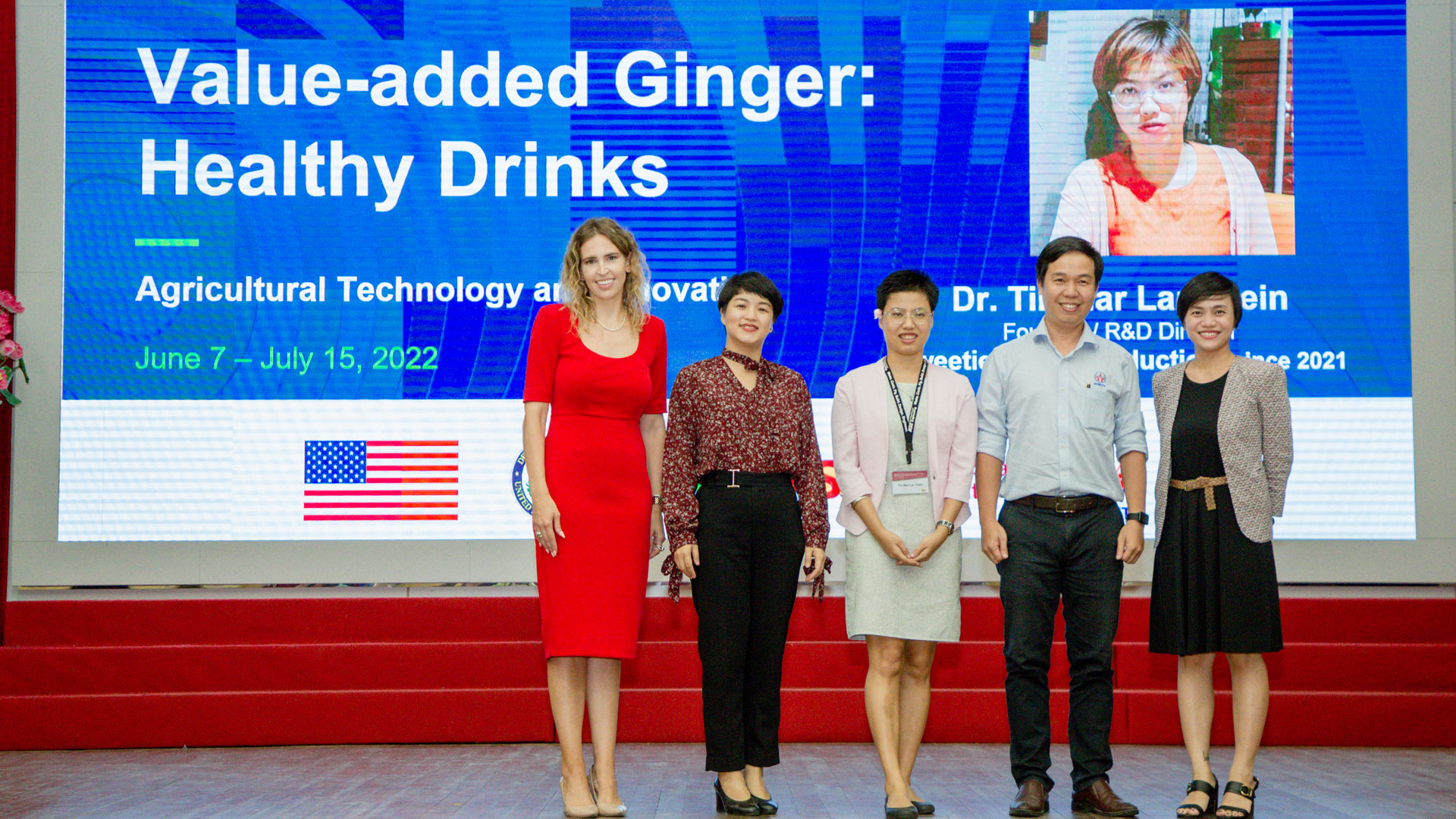
Tin Mar Lar Thein (center) won $15,000 in the 2022 Mekong-U.S. Partnership Young Scientist Program for her business idea to use Myanmar’s domestically produced ginger to make healthy drinks to sell to the local population. She is pictured with (from left to right) Meghan Gibson, and judges Phan Thi Thuy Ly, Pham Bach Duong and Quynh Dang on the final day of the program. Photo courtesy of Meghan Gibson
“Ms. Tin Mar Lar Thein identified a major gap between ginger farms and consumers,” Gibson says. “Currently, there are few to no producers of ginger beverages in Myanmar, creating a large surplus of ginger that is exported or goes unused.”
Gibson says capitalizing on this market helps local farmers receive increased margin or return for their products and the market gains new beverage products like ginger ale and ginger plum kombucha.
She says Thein’s project also stood out because of its relatively advanced stage of development.
“This project has already begun initial testing by developing a minimal viable product that is undergoing initial distribution in the Myanmar market,” Gibson says.
Many of the participants are taking what they learned about the agricultural technology and business landscape of their home countries and the broader region and are now looking to the future to continue developing their business ideas.
Avakat Phasouysaingam, a lecturer in the Faculty of Agriculture at the National University of Laos, is also eager to bring what he learned back to his students. He developed a project to address alcohol-related issues in Laos by developing a juice from yanang, a plant also known as bamboo grass, which has alcohol detoxification properties.
“The students need to have experience in working, applying their knowledge and having their own goals after university,” Phasouysaingam says. “I participated in the MUSP Young Scientist Program to learn and exchange with others on how they created the idea of their startup and how they began their project. I would like to apply this experience to teaching and helping my students to start up their own businesses after university.”
Phoo has also used what she learned to shape her future; instead of pursuing a doctoral degree in the United States, Phoo has decided to stay in Myanmar and work on her startup to solve the problem she identified.
“I have shared the problem with others and asked them to solve it. But I have never tried to solve the problem myself,” Phoo says. “Now, I really wish to solve the problem with my own product. I believe that this is my future.”
















